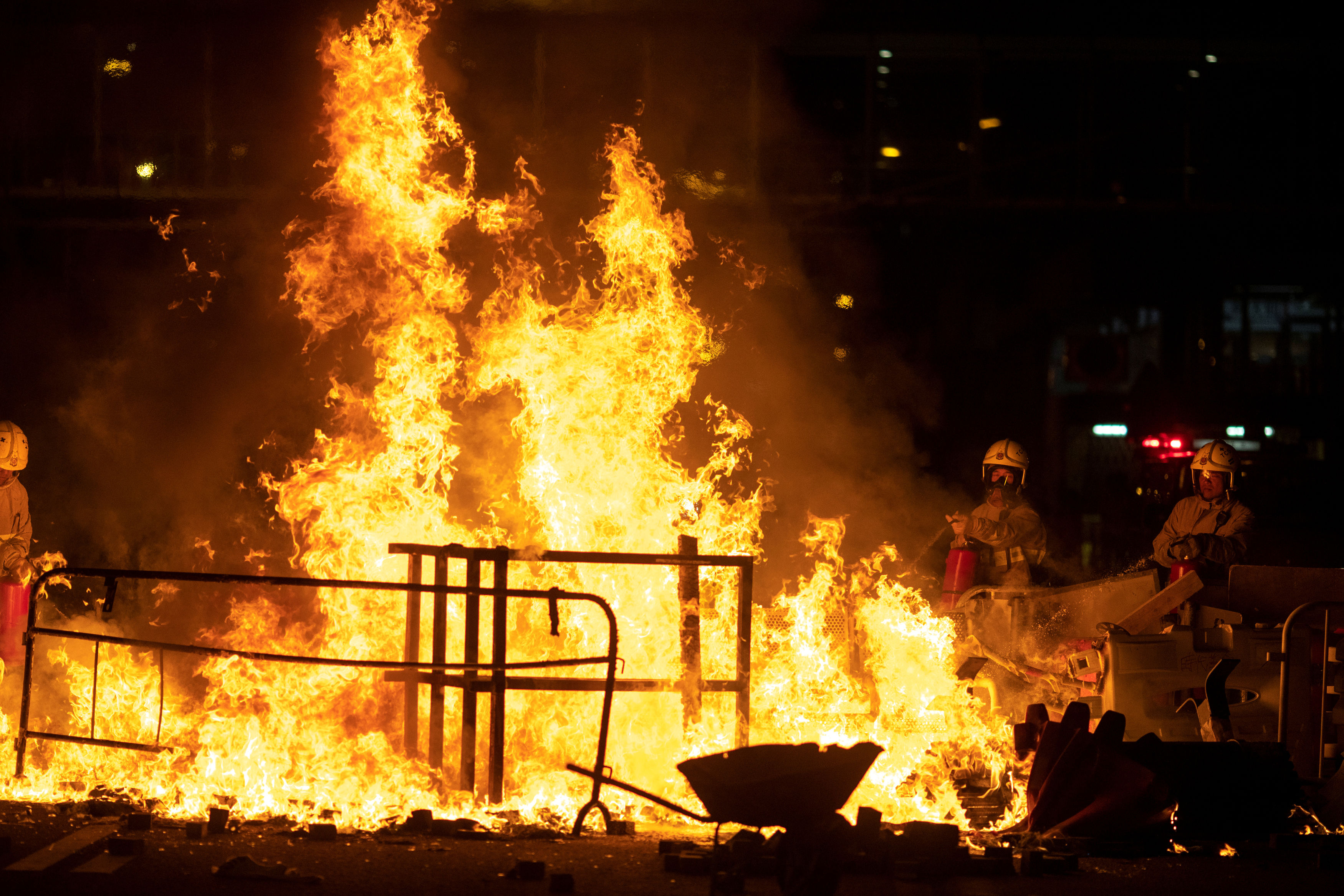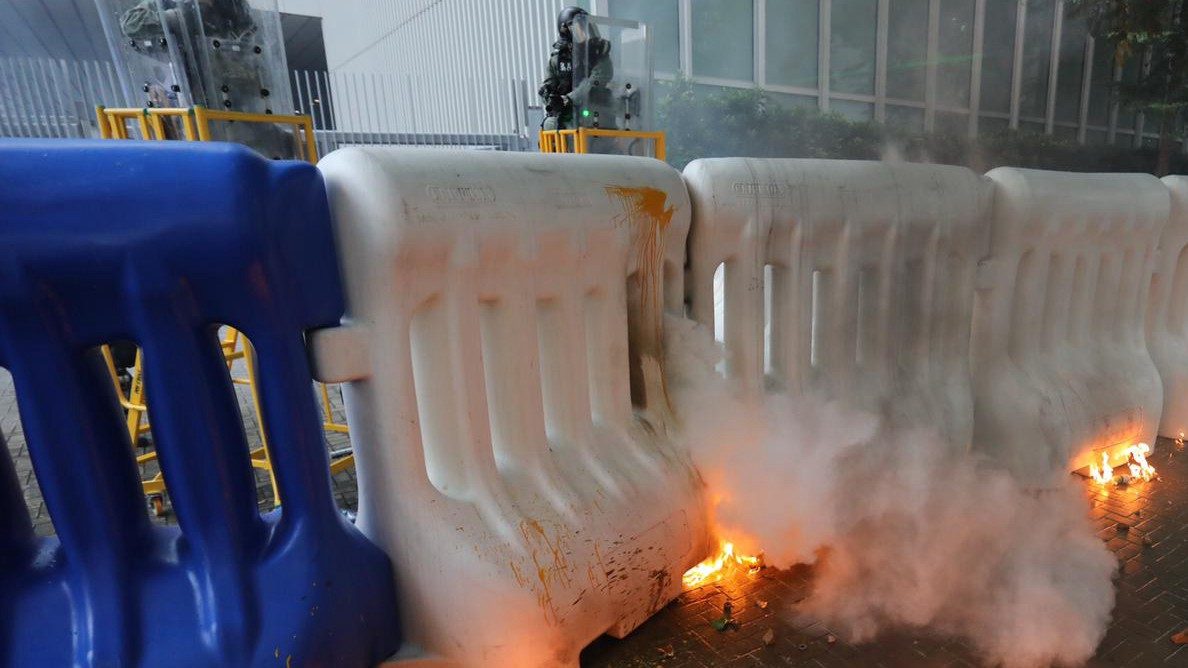
Editor's Note: Tom Fowdy is a British political and international relations analyst and a graduate of Durham and Oxford universities. He writes on topics pertaining to China, the DPRK, Britain and the United States. The article reflects the author's opinion and not necessarily the views of CGTN.
On the night of October 4, authorities of the Hong Kong Special Administrative Region implemented an emergency law banning the use of masks in protests and riots. The use of masks in this context, which have been wielded by perpetrators to conceal their identities from law enforcement, is banned in the legal provisions of most Western countries, including the United States, the United Kingdom and Germany. The announcement prompted a fresh wave of destruction within the city last night, which appears to be becoming more violent and even less tolerant.
Inevitably, Western mainstream media are doing their usual job of offering the activists full and uncritical support. They have moved to portray the mask ban as an act of authoritarianism that is "taking away the rights" of Hong Kong people and are giving the episode blanket coverage despite the presence of worse and even deadly protests in other areas of the world.
In doing so, it must be set out clearly how they are providing the public with a false narrative. They are intentionally conflating necessary law enforcement against public disorder with the suppression of civil liberties.
However, this would not be tolerated in their own countries. What they are not telling you is that policing and measures against rioting in Western countries is identical to that of Hong Kong. In the process of this, they are creating an exaggerated and selective narrative of police brutality, advocating the ridiculous assumption that authorities simply have to "tolerate" the destruction.

Firefighters try to extinguish a fire set by anti-government protesters, in Wong Tai Sin district, Hong Kong, China, October 4, 2019. /Reuters Photo
Firefighters try to extinguish a fire set by anti-government protesters, in Wong Tai Sin district, Hong Kong, China, October 4, 2019. /Reuters Photo
The utilization of law enforcement against public disorder and open destruction of property is neither a suspension nor suppression of civil liberties, a line which has been repeatedly claimed by leading Hong Kong activists such as Joshua Wong and repeated in the press. Protesters in Hong Kong have regularly started fires, brought public infrastructure to a standstill, thrown acid and relentlessly smashed up businesses.
However, the utilization of moderate force – and we can say moderate force, not a single Hong Kong resident has been killed by the police – to restore order against this kind of activity is a routine policing practice and is in line with those found in Western countries.
Let us look at the United Kingdom Public Order Act of 1986, which sets out contemporary riot law. First of all, UK police, like Hong Kong police, have the right to deny a protest if chief police officers believe there is a significant risk to public order or property. The BBC likes to portray protests as being "banned" to further its narrative.
Second, as a comparative example, the UK police have a legal right to deny a crowd access to a given public space if there is a deemed risk to safety or property. In turn, those who are charged with the offense of "riot" – "Where 12 or more persons who are present together use or threaten unlawful violence for a common purpose" – may face up to 10 years in prison. Note, it does not judge that purpose on its moral merits.

Violent protesters threw petrol bombs at the Central Government Complex, Hong Kong, China, August 31. /CGTN Photo
Violent protesters threw petrol bombs at the Central Government Complex, Hong Kong, China, August 31. /CGTN Photo
The laws of other Western countries are similar. The baseline is that if this behavior were repeated in their own countries, it would simply not be tolerated. In fact, when the United Kingdom was engulfed in riots in 2011, whereby 3,000 people were arrested, the press actually complained that the police were not "tough enough," and the Daily Telegraph even recommended utilizing the military.
Yet in Hong Kong, we have a marked exaggeration of difference. That is, all attempts to stop riots are somehow an act of political oppression and that authorities must simply "tolerate" the violence or be accused of brutality. Is that honest or fair?
In portraying it this way, outlets such as the BBC are giving deliberative focus to events in Hong Kong while ignoring worse incidents around the world. They repeatedly emphasize that an 18-year old was shot as a benchmark of brutality, yet they omit that it was in a weaponized struggle against an individual officer, and the youth is not dead. At the same time, they are choosing to give little coverage to riots and protests in Baghdad, Iraq, where police have opened fire on crowds with live ammunition, with over 65 dead as of this morning.
Thus, the Western media aren't telling us the truth. Their coverage is purposefully misrendering law enforcement in Hong Kong as political oppression, creating a falsified contrast with identical anti-riot laws and measures back home while also giving undue focus to events on the ground in the bid to consolidate the narrative while ignoring other activities elsewhere. In doing so, they are actively inflaming and enabling extreme disorder, lawlessness and a state of anarchy in the city with the protesters knowing they can do no wrong.
(If you want to contribute and have specific expertise, please contact us at opinions@cgtn.com)